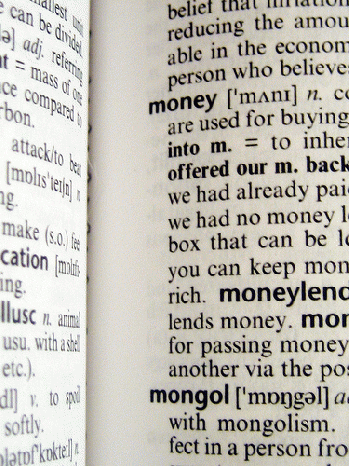| Back OpEd News | |||||||
|
Original Content at https://www.opednews.com/articles/Democratic-Network-Money--by-Paul-Krumm-Balance_Barter_Commons-The-Public_Economy-161006-865.html (Note: You can view every article as one long page if you sign up as an Advocate Member, or higher). |
|||||||
October 6, 2016
Democratic Network Money: Commons Money that Works for Us, Instead of Us Working for It, Part 1
By Paul Krumm
This article is the first in a series that will define money, and then look at the different ways that it can be organized. In this first installment we will define money and describe a simple system that clarifies money operation.
::::::::
What is Money? We often talk about what money does, but what is it? The best definition that I have found is from Bernard Lietaer, a prominent Belgian economist.
Money is an agreement within a community to use something as a medium of exchange.".
Money is an agreement, not physical stuff.
Whether money be represented by cattle or cowry shells, whether it be tally sticks, gold, silver, paper money, or simply numbers in an accounting system, it is its symbolic value that counts.
What does this symbolic value represent? It is the willingness of its users to trade their time and energy for the time and effort of others, each doing what they are able and have learned to do, or can learn to do, in trade with others in their community.
Money simply formalizes informal exchange. It makes possible keeping track of each person or group's economic contributions and withdrawals in a complex economy.
Unlike barter, money makes possible transactions between multiple traders. Money also allows for flexibility in the timing of transactions. In so doing it represents commitments between its users, keeping an accurate accounting of who has contributed how much, and who has bought how much over time.
Physical objects are poor measures of this symbolic value, as their value is affected by supply and demand, rather than being an accurate measure of time and effort . An accounting system structured to measure time and effort is the natural solution .
It is trust in making and keeping commitments to balance budgets (production and consumption) that allows all money systems (including our own) to operate.
To summarize: Money is the name we give to accounting numbers that measure contributions and consumption in the economy. Money relies on trust in the reliability and fairness of the accounting system structure, and trustworthiness on the part of its creators and its users, for its successful operation.
Simple money
Let us make our inquiry into money concrete with a simple example of how it can operate. To model this example we will extend barter, the way of the gifting economy, that existed (and still exists) in 'primitive' communities.
To mimic barter, we create a formal system of balanced trade. In this simple money system, all market group members start out with a zero balance in their accounts. So all transactions don't have to be simultaneous, balances revolve around zero, both plus and minus. Keeping balances close to zero maintains a situation where everybody is carrying their weight.
Having the system be open source, not for profit, and taking the form of a network, rather than a centralized system of issue, makes its structure consistent with the values of democracy and justice. It makes money a commons, rather than an authority centered institution. In this way we mimic the reciprocity of the gifting economy in the structure of money.
In operation, think of it as using a kind of blockchain credit/debit system. In this money system, if some person or group (lets call them 'A') buys something, say food, their account gets a negative entry. Person or group 'B' providing that food gets a positive entry. Those entries represent the creation of money.
Buyer 'A's negative entry represents a commitment to provide something for someone else to bring their balance back toward zero. Seller 'B's positive entry represents a claim on the commitment of other community members for what they need.
The concept of commitment, and claims on commitment is very important to the operation of money. It is a major reason that trust is necessary in its operation. Commitment and claims on commitment also relate to the concept of capital, which we will discuss in the next article in this series.
Authors Bio:
I am a semi-retired self employed business owner who designs and builds instruments and machines. Obtained a BS in Sociology (with minors in Physics and Math) in the 1960's and became interested in studying the structural violence built into our social, political and economic systems as an avocation.
I live off grid with my wife in an earth sheltered home I built in rural central Kansas.
